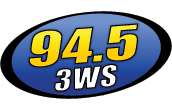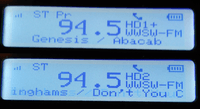WWSW-FM
WWSW (94.5 FM) – branded 94.5 3WS – is a commercial classic hits radio station licensed to serve Pittsburgh, Pennsylvania. Owned by iHeartMedia, the station covers the Pittsburgh metropolitan area. The WWSW studios are located in the Pittsburgh suburb of Green Tree, while the station transmitter resides in Pittsburgh's Perry South neighborhood. Besides a standard analog transmission, WWSW broadcasts over two HD Radio channels, and is available online via iHeartRadio.
 | |
| City | Pittsburgh, Pennsylvania |
|---|---|
| Broadcast area | Pittsburgh metropolitan area |
| Branding | 94.5 3WS |
| Slogan | Pittsburgh's Classic Hits |
| Frequency | 94.5 MHz (HD Radio) |
| First air date | December 12, 1940 |
| Format | Classic Hits HD2: Rhythmic oldies |
| ERP | 50,000 watts |
| HAAT | 247 meters (810 ft) |
| Class | B |
| Facility ID | 59968 |
| Transmitter coordinates | 40°27′48.2″N 80°0′17.1″W |
| Call sign meaning | Originally used on the former WWSW (970 AM); now WBGG |
| Former call signs | W47P (1940–43) WTNT (1943–45) WMOT (1945–49) WWSW-FM (1949–73) WPEZ (1973–80) |
| Former frequencies | 43.5 MHz (1940) 44.7 MHz (1940–45) |
| Affiliations | Premiere Networks USRN |
| Owner | iHeartMedia, Inc. (AMFM Radio Licenses, L.L.C.) |
| Sister stations | WBGG, WDVE, WKST-FM, WPGB, WXDX-FM |
| Webcast | Listen Live |
| Website | 3wsradio |
WWSW is notable for being an FM "superpower station", with an output exceeding Federal Communications Commission (FCC) restrictions for Class B FM signals.[1]
History
On August 13, 1940, Walker & Downing Radio Corporation applied to the FCC for a construction permit to build a new FM station. It would broadcast on 43.5 MHz in the original FM broadcast band, which was located between 42 and 50 MHz. The FCC granted the permit on December 12, 1940, while reallocating the station to 44.7 MHz and assigning the station the W47P call sign. The station was granted its first license by the FCC on May 20, 1942. On September 23, 1942, the FCC modified the station's license when Walker & Downing Radio Corporation changed its name to WWSW, Inc., named after co-owned WWSW (970 AM).[2]
On November 1, 1943, the station was assigned the WTNT call sign, followed by another call sign change effective October 3, 1945 to WMOT.[2]
The FCC created the current FM broadcast band on June 27, 1945.[3] The commission granted WWSW, Inc. the authority to cease operations effective December 12, 1945, so the station could be converted to a new frequency on the new band.[2] On July 25, 1946, the FCC reallocated the station to 94.5 MHz, and granted WWSW, Inc. a construction permit for operation on the new frequency effective November 13, 1947.
On February 24, 1949, the call sign was changed to WWSW-FM. Following a series of modifications to the construction permit from 1947 to 1954, the FCC granted the station a new license with the new facilities on January 11, 1954.[2]
The station's license was voluntarily reassigned to WWSW Radio, Inc. effective August 1, 1955. On December 21, 1957, the FCC granted the new owner a construction permit to increase the station's effective radiated power (ERP) to 50,000 watts while increasing the antenna height above average terrain (HAAT) to 940 feet. A new license with the upgraded facilities was granted by the FCC on September 25, 1958.[2] Due to subsequent regulations adopted by the FCC that significantly limit the height placement for Class B FM stations corresponding to their ERP, WWSW-FM is recognized as a grandfathered “superpower” station.[4][1]
WWSW Radio, Inc. was granted a construction permit by the FCC on August 6, 1967 to install a new transmitter and antenna. The permit lowered the station's HAAT to 810 feet. The FCC granted a new license with the new facilities on August 1, 1969.[2] In the late 1960s, WWSW-FM switched to an automated Top 40 format while WWSW remained a Top 40 station with live disc jockeys.[5]
On November 18, 1973, the station's call sign was changed to WPEZ, carving out its own identity apart from WWSW.[2] WPEZ was a successful Top 40 station for the next seven years. On Labor Day, 1980, the station gave up top 40 for an adult contemporary format. The station's call sign was changed back to WWSW-FM on September 28, 1980.[2] For most of the 1980s, WWSW-FM began to add more oldies titles into its playlist, to distinguish it from other Pittsburgh AC stations.
The AM and FM stations both flipped to all-oldies in February 1988, simulcasting for part of the time. When not simulcasting, the FM played a core blend of oldies hits from the 1960s and early 1970s, while the AM leaned more towards 1950s and early 1960s titles. In 1991, the AM's independent programming was abandoned and began simulcasting the FM 100%.
The AM split from the FM in August 2000 and adopted a sports radio format as WBGG. In 2006, it was announced that Pitt Panthers football and basketball games would be aired on WWSW-FM. This lasted until 2012, when the team's games switched to KDKA-FM.
Like many FM oldies stations in the early 2000s, WWSW-FM had been de-emphasizing music of the 1950s and 1960s in favor of more songs from the 1970s and a few early 1980s titles. It also stopped using the word "oldies" on the air. In 2006, the music was abruptly adjusted forward with more emphasis on the 1970s and even more from the 1980s. The station started to play artists it had ignored before, including Styx, Huey Lewis & the News, Prince and Bruce Springsteen, while dropping long-time staples of an earlier vintage like the Dave Clark Five, Little Richard, Gary Lewis and the Playboys and Herman's Hermits. However, The Beatles and Motown continued to be a staple of the station's playlist.
By the 2010s, the only 1960s tracks that remain on the station's playlist were those that had a high level of popularity over the years, including songs by The Beatles, Simon and Garfunkel, The Supremes, and The Rolling Stones. In addition, the station began to incorporate some tracks from the early 1990s into the playlist, including hits from Bryan Adams, R.E.M., Prince and Sheryl Crow. The station's playlist began focusing on the mid-1970s all the way up through 1989, with a few late 1960s, early 1970s, and early 1990s tracks also getting airtime.
Beginning each year in early to mid-November, WWSW switches to all Christmas music, including both classic Christmas standards and some recent material. During the holidays, WWSW suspends some features such as the "All Request Cafe," "The Ultimate Radio Party" and replays of 1970s/1980s versions of American Top 40. Currently, WWSW has only four live, local airstaff - Jonny Hartwell (weekdays, 5-10AM), Sheri Van Dyke (weekdays, 10AM-3PM), and Mike Frazer (weekdays, 3-9PM). Bonnie Diver, morning traffic director for iHeartMedia Pittsburgh and former 3WS midday host, also contributes to the morning drive show. Outside of this time, the station carries talent from iHeartMedia’s Premium Choice network (which is also utilized when Sheri and Mike are absent), which is voice-tracked from out-of-market, as well as several nationally-syndicated shows.[6]
Past air personalities on 3WS include Jim Merkel, Gary Dickson, Kenny Woods, Steve Hansen, Cris Winter, Bumper Morgan (deceased), RD Summers (deceased), Theresa Colaizzi, Ray Walker (deceased), Clarke Ingram, Lani Daniels, Mike Steele (deceased), Steve Grenato, and Kate Harris. During the prime years at 3WS, the morning show featured Merkel and Dickson.
The station had oldies concerts that filled Three Rivers Stadium many times with oldies acts, and even legendary oldies DJ Wolfman Jack made an appearance on February 23, 1991. The station received 3 Marconi Awards for best oldies station in the United States, while the morning show received five AIR awards (Achievement in Radio) for best morning show in Pittsburgh. Longtime air personality Jim Merkel was released from 3WS on October 4, 2010, after more than 31 years on the staff.
WWSW HD2
On April 25, 2006, Clear Channel announced that WWSW's HD2 subchannel would carry a format focusing on Rhythmic Oldies, which was originally heard on the former WJJJ (104.7 FM). In 2016, when 3WS cancelled its weekly Sunday Night Diner program, the format of the HD2 station was changed to 1950s and 60s oldies, similar to what was heard on the diner program each week. In addition, the subchannel carried Duquesne Dukes football and men's basketball games, as well as pre-game, post-game, and coaches shows for both sports.
References
- Smith, D. (July 5, 2013). "Superpower FMs". w9wi.com. Retrieved 2019-08-28.
- "History Cards for WWSW-FM". fcc.gov. Federal Communications Commission. Retrieved 2019-08-29.
- "In the Matter of Allocation of Frequencies to the Various Class of Non-Governmental Services in the Radio Spectrum from 10 Kilocycles to 30,000,000 Kilocycles (Docket No. 6651)" (PDF). fcc.gov. Federal Communications Commission. June 27, 1945. Retrieved 2019-08-29.
- "FM Broadcast Station Classes and Service Contours". fcc.gov. Federal Communications Commission. Retrieved 2019-08-28.
- Broadcasting Yearbook 1972 page B-182
- "Find 3WS Radio's Thursday Live On-Air Schedule". 3WS Radio. Retrieved 2020-06-18.
External links
- WWSW-FM official website
- Query the FCC's FM station database for WWSW
- Radio-Locator information on WWSW
- Query Nielsen Audio's FM station database for WWSW
